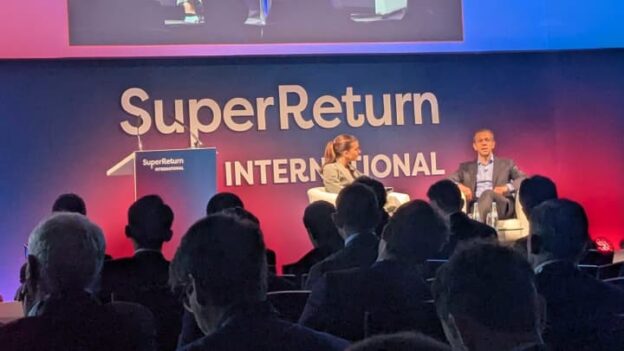- Enthusiasm around Europe has dominated discussions at one of the world’s biggest private markets conferences.
- The U.S. remains a market juggernaut with numerous opportunities, attendees told CNBC— but political stability, fiscal spending pledges and proposed regulatory reforms have transformed perceptions around Europe.
- Private equity is grappling with subdued M&A activity and a slowdown in returns, along with uncertainty fueled by U.S. policy.
BERLIN – At the world’s largest gathering of private equity professionals, the buzz around opportunity in Europe is undeniable, in a sharp reversal of sentiment from this time last year.
That shift comes amid subdued dealmaking, depressed new listings on public markets and stuttering returns, coupled with U.S. President Donald Trump’s volatile policymaking stateside.
Blair Jacobson, co-president of private equity firm Ares Management, told the SuperReturn conference in Berlin on Wednesday that there was a “feeling right now that European markets are very attractive.”
Positive factors include falling interest rates and Germany’s 500 billion euro fiscal package, he said. Jacobson said he was also encouraged by last year’s Draghi report, which urged deregulation and increasing European competitiveness.

“Europe is growing up and taking control of its own destiny, which can be positive for macro trends,” he said, noting there was more of a pull factor into Europe than a push factor out of the U.S.
Ares is focusing more on its international exposure and sees massive opportunities outside of the U.S., Jacobson added — evidenced by its recent acquisition of global alternative asset manager GCP International for $3.7 billion, which increased its exposure in Europe as well as in Asian infrastructure.
Optimism toward Europe comes amid lackluster appetite from institutional investors. Data from Prequin shows Europe-focused private credit funds raised nearly $26 billion, down by 69% compared to the $82 billion peak hit in 2021.

But Jacobson’s comments were echoed by Blackstone’s Vice Chairman Thomas Nides, who said that increased political stability in France, Germany and the U.K. means “shifting money into Europe is certainly not a bad bet.”
Nides nonetheless stressed that the muted M&A and IPO activity observed at a time of chaotic policymaking in Washington “will pass”.
“Trump keeps everyone on edge, and for people who are market participants, that’s anxiety ridden. Boardrooms are cautious in decision-making,” he said.

“When you’re a long-term investor you need to invest through cycles… Things will calm down, issues around tariffs will subside over time, and we’ll get back to equilibrium.”
Asset managers are building headcount in Europe on the potential for new opportunity, Tamsin Coleman, private debt specialist at Mercer, told CNBC.
“There hasn’t been a wholesale shift in capital from the U.S., only at the edges or home buyers who were overweight in the U.S. adjusting slightly,” she added.
Defense push
Digital infrastructure such as data centers, energy efficiency and defense came up repeatedly as key areas of growth potential during the SuperReturn morning sessions on Wednesday, including by Ivano Sessa, partner and co-head European private equity at Bain Capital.
“We like to invest in pockets of growth in Europe,” Sessa told the conference, calling defense a sensitive but interesting area in which the combination of risk-adjusted growth potential and visibility was “very unique.”
Highlighting the sentiment shift, Julian Salisbury, co-chief investment officer at Sixth Street, told a panel moderated by CNBC’s Leslie Picker that “last year, everybody seemed all-in on growth in the U.S. That’s usually a sign you should start considering other options.”
Salisbury noted the yawning valuation gap in European assets versus their U.S. counterparts since 2008, along with the desire among many growth-oriented European companies to list in the U.S. or be taken private from the public markets.
“There’s a real opportunity for private capital [in Europe] to invest at lower valuations. There are still great businesses here,” he said. As an example, he cited Sixth Street’s recent investment in fried chicken franchise Wingstop, a growing business he says is resilient to factors such as interest rate fluctuations.
https://www.cnbc.com/amp/2025/06/04/private-equity-bosses-turn-bullish-on-europe.html





